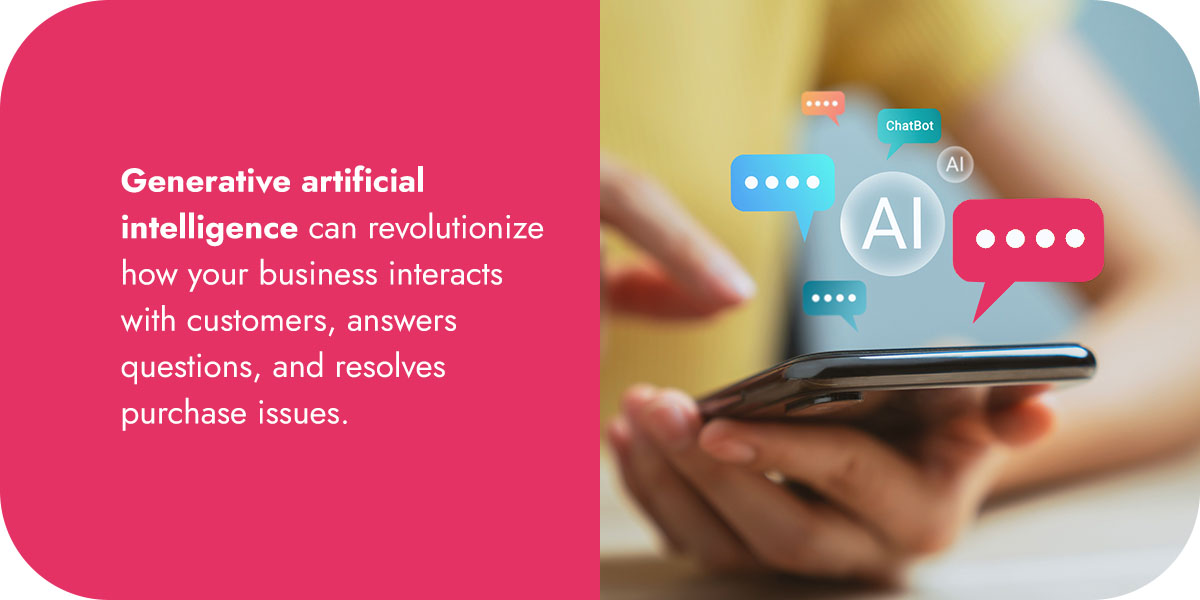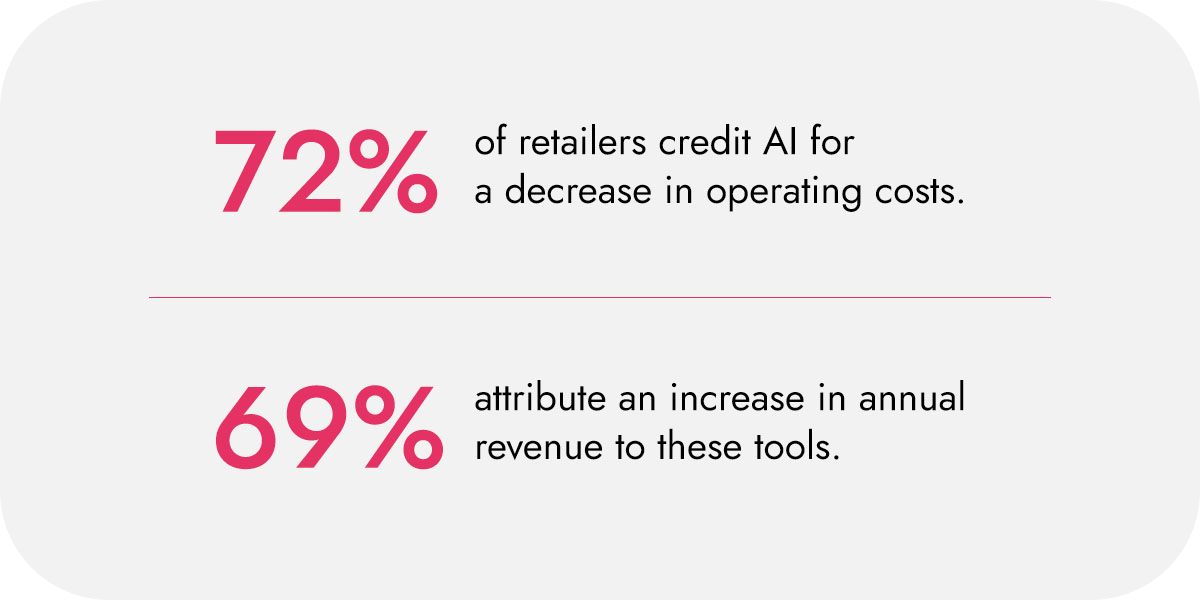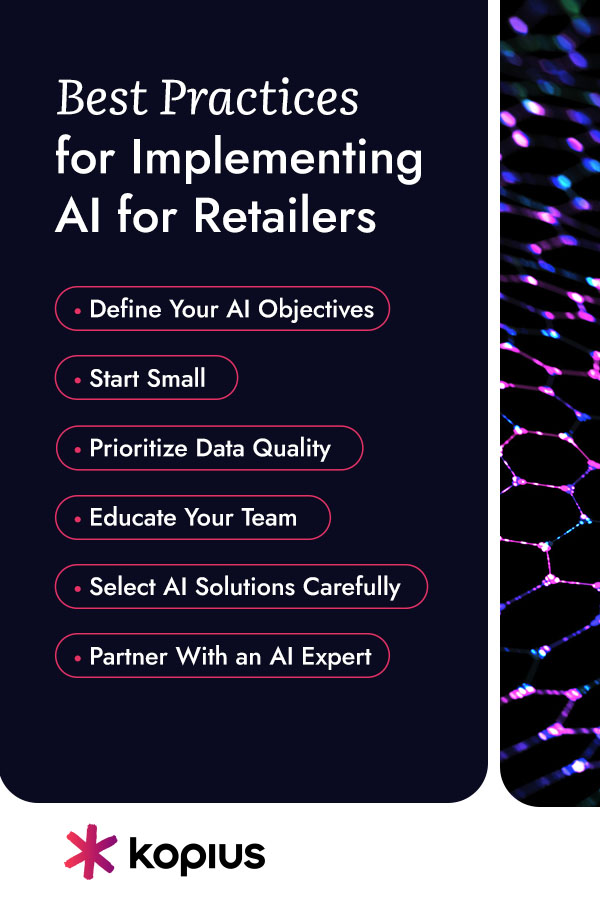
Artificial intelligence (AI) is revolutionizing the retail sector, giving businesses greater access to valuable customer data and market insights than ever before. Implementing AI strategies can be highly advantageous for brands looking to meet changing consumer demands and protect their bottom line.
About 40% of retail executives say their companies already use automated artificial intelligence technologies, and 80% say they plan to implement these strategies by 2025. Understanding how your business can utilize AI in retail is key to capitalizing on these solutions for long-term stability, enhanced operations, and profound growth.
Check out the primary use cases and advantages of artificial intelligence for the retail industry below.
8 Use Cases for Artificial Intelligence in Retail
As AI’s popularity and capabilities grow, so do the number of ways your brand can use these tools. Top AI use cases in retail include:
1. Inventory Management
Artificial intelligence can streamline inventory management operations by analyzing historical sales data and customer behavior to accurately predict demand. It can help your retail business maintain optimized stock levels and anticipate trends.
AI-powered inventory management solutions can automate stock replenishment processes, preventing stockouts that frustrate consumers. They also help you avoid overstock situations, identify slow-moving items, and detect anomalies like sudden sales spikes. These insights enable your business to adapt quickly and ensure customers can get the products they want when they want them.
2. Personalized Marketing
AI is an incredible tool for supercharging retail marketing initiatives. These tools and strategies can help businesses deliver personalized campaigns to consumers. Targeted campaigns increase the likelihood of engagement and conversion.
They also enable predictive analytics based on customer data, preferences, and behavior to forecast trends and optimize marketing messages for the greatest return on investment. AI is particularly helpful for identifying the most relevant messages to share at the best time for particular marketing channels.
3. Product Recommendations
By analyzing customer browsing behavior and purchase histories, artificial intelligence can deliver personalized product recommendations that resonate with consumers and increase sales.
AI-powered strategies can automate upselling and cross-selling initiatives for retailers by suggesting complementary products at checkout. Paired with machine learning (ML), AI helps businesses continuously adapt and improve recommendations. They can use consumer feedback to refine the algorithm and increase the likelihood of conversion.
Retailers can also use AI to support personalized shopping experiences and assist consumers while they browse.
4. Automated Customer Service

Automated customer service is among the top examples of AI in retail. Generative artificial intelligence can revolutionize how your business interacts with customers, answers questions, and resolves purchase issues. You can use automated chatbots empowered by natural language processing and ML algorithms that understand and can reply to customer inquiries.
Automated, AI-powered chatbots on your website and social media can help consumers around the clock, reduce administrative burdens on your retail staff, and ultimately improve customer experiences.
5. Predictive Analytics
Retailers can also use artificial intelligence for predictive analytics to accurately forecast future trends, make data-driven decisions, and anticipate customer behavior.
You can train AI models using historical data to predict everything from demand planning to risk management. The AI algorithm can identify patterns and correlations within massive datasets, helping retailers uncover valuable insights to stay ahead of market changes and maintain a competitive edge.
Using predictive analytics insights enables retailers to enhance customer shopping experiences while protecting their bottom line.
6. Pricing Optimization
Artificial intelligence enables retail businesses to develop dynamic pricing models by analyzing various historical and real-time data regarding the following:
- Competitor prices
- Purchase histories
- Market dynamics
- Current demand
- Inventory levels
- Seasonality
Retailers can use AI to maximize profitability and revenue, ensuring you price your products competitively in today’s fast-paced market. Dynamic pricing algorithms utilize machine learning and AI to automate price changes for your business, saving your team time and energy.
7. Supply Chain Optimization
Retailers can also use artificial intelligence to improve supply chain management. After years of supply chain complications and delays, retailers began using AI for real-time monitoring and predictive analytics to support resilience.
AI-powered tools can enhance visibility into logistics operations. This helps businesses choose optimized delivery routes, streamline warehouse processes, and improve supplier relationships. Automated AI solutions and machine learning also allow retailers to achieve:
- Increased efficiency.
- Lower operating costs.
- Minimized human errors.
8. Foot Traffic Analysis
Foot traffic analysis is an advantageous way to use AI in retail stores. Businesses can use AI and machine learning algorithms to track customer movement through a retail space and use that data to optimize store layouts and enhance operational efficiency.
AI solutions can analyze traffic patterns, popular areas, and dwell times to determine what products attract customer attention. Foot traffic analysis data can inform staffing levels and product placements to support better overall shopping experiences.
6 Key Benefits of Using Artificial Intelligence in the Retail Industry
AI can streamline and enhance many elements of running a successful store online and offline. The following are six key benefits of leveraging AI for shopping and retail:
1. Operational Efficiency
Artificial intelligence strategies can significantly improve your retail business’s operational efficiency by automating various time-consuming processes, from inventory management to customer service to supply chain administration. Your business can use different tools and solutions to streamline daily tasks and create smoother processes, making planning and scaling your operation easier.
AI reduces the strain on your team members, giving them more time and energy to enhance your business and help your customers.
2. Reduced Labor Requirements
A huge advantage of introducing artificial intelligence into your retail business is reducing the labor requirements to keep your store running effectively. You can save significant costs and lessen the administrative strain on your team. AI decreases human error, saving your employees and managers time and stress caused by missteps like ordering too much inventory of a particular product.
AI-powered customer service is particularly helpful for your retail team, helping them reduce the time spent answering repetitive inquiries and dealing with basic customer requests. You can rely on chatbots to ease administrative burdens and reduce the number of customer service individuals you need on the job.
3. Enhanced Customer Experiences
AI strategies make it easier for your business to deliver better customer experiences. Automated customer service is particularly helpful for catering to consumer needs and offering them greater convenience. With AI-powered chatbots, your customers can get answers to their questions around the clock. Whether they need to ask about a product or service at midnight or noon, retailers can use artificial intelligence to offer assistance and resolve their inquiries as fast as possible.
4. Increased Profitability

AI and machine learning in retail can help your business become more profitable. In fact, 72% of retailers credit AI for a decrease in operating costs, and 69% attribute an increase in annual revenue to these tools.
Through boosted efficiency and automation, AI enables businesses to boost operational efficiency, productivity, and turnaround times. Retailers can use these solutions to build positive customer relationships, driving increased loyalty, retention, and sales.
5. Personalization
Today’s consumers want personalization and the increased convenience of tailored shopping experiences. Artificial intelligence is invaluable for delivering personalized communications and product recommendations to drive customer engagement and make your shoppers feel special.
AI-powered personalized experiences enable your retail business to cultivate more meaningful and profitable customer relationships. They can drive customer retention, increase conversions, and make shopping at your stores more enjoyable.
6. Competitive Advantage
Artificial intelligence gives retailers a significant advantage over businesses that do not use these solutions. Automated AI enables faster and more accurate processing, analysis, and decision-making. Your business can use AI to quickly identify risks, resolve customer issues, and supercharge inventory management for better operations overall.
Navigating the Challenges of AI in the Retail Industry
While artificial intelligence offers many advantages to retailers, a few hurdles can complicate the integration process:
Privacy and Security
Retailers must prioritize robust data security measures when implementing artificial intelligence solutions. Today’s consumers want to know how you use their personal information and that it is secure. By following strict data protection rules, your business can mitigate the risk of data leaks and breaches.
Different privacy approaches, such as strong access controls and encryption, help retailers overcome these challenges. Through transparency about your AI-related data processes, you can also instill greater trust in your customers.
Data Quality and Integration
Another common pitfall of introducing artificial intelligence into your retail operations is ensuring data quality through smooth integration with other data-collecting systems.
AI models need accurate, consistent data to deliver the most reliable insights to your business. Your AI system likely collects data from multiple sources, and improper standardization practices can lead to disparities, inconsistencies, and errors. Data quality is essential for gaining the most useful and correct insights for important decision-making.
AI Knowledge Gaps
Artificial intelligence technology is new for many individuals. Your team members may not fully understand AI’s key abilities and uses, and some people have misconceptions about these solutions. The knowledge gap can hold your business back.
To capitalize on the many benefits of AI, your retail employees may need training and educational opportunities to help them learn how to responsibly utilize these tools and how they can benefit their daily processes.
Ethical Considerations
AI strategies are not perfect, and you must be conscious of the potential biases in your machine learning algorithm. If bias exists in the training dataset, your outcomes may be unethical and negatively impact certain communities. Ongoing monitoring, refining, and evaluation of your artificial intelligence systems is essential for mitigating bias and ensuring these tools’ most fair and ethical uses for decision-making.
Customer Acceptance
Some consumers are apprehensive about the use of artificial intelligence. Sharing how your business leverages AI and taking full responsibility for its outcomes is essential for instilling greater confidence among your shoppers.
The more your business shares regarding its AI practices, the more consumers will accept it and trust that you are using their data responsibly.
Best Practices for Implementing AI for Retailers
Successful AI implementation requires careful planning. The following are best practices to consider for seamless retail execution:

Define Your AI Objectives
Begin by outlining your business’s goals relating to AI. You may want these solutions to optimize operations, increase sales, or improve customer experiences. Whatever your top objectives are, identify key performance indicators to help measure and track your success. Consider your overall business goals and how AI can support your overarching purpose. These goals should be realistic and achievable, especially at the beginning.
Start Small
The best approach to introducing artificial intelligence into your retail business is to start on a small scale, focusing on specific use cases. Your team can use this opportunity to learn from initial implementations and gather feedback to inform decision-making. It is best to gradually expand your AI capabilities rather than do a massive technological overhaul, which can frustrate your team and customers.
Prioritize Data Quality
Your data needs to be accurate and relevant to support the success of your artificial intelligence initiatives. Prioritize high-quality data by investing in data cleaning, standardization, and enrichment processes. Proper data governance practices will also help your retail business maintain data quality over time, ensuring your insights are valid and useful for informing important decision-making.
Educate Your Team
Providing your team with adequate training, resources, and educational opportunities regarding AI technologies and concepts is key to the most successful implementation possible for retail businesses. Your employees must understand how AI will impact their roles and responsibilities and how to implement your solutions to deliver the best customer experiences. Share your business’s AI objectives, and be transparent about AI’s uses in your business.
Select AI Solutions Carefully
Choose AI solutions for retail with integration, compatibility, scalability, and integration in mind. The systems you work with need to align with your objectives and address specific opportunities for your business. Not all artificial intelligence tools are created equally, so selecting those with robust security and retail-specific capabilities will contribute to smoother, more streamlined operations.
Partner With an AI Expert
Retailers can enjoy a significantly easier AI integration process by working with AI experts like the team at Kopius.
We’ll help you JumpStart your success by delivering cutting-edge AI, ML, and retail technology. We understand the best practices for these solutions to enhance your business’s growth and meet your top goals. We’ll assist you in fostering tech-enabled innovation to boost digital and in-store experiences for your customers. With our help, you’ll be lightyears ahead of the competition.

JumpStart Your Retail AI Journey With Kopius
Kopius helps retail businesses use artificial intelligence and machine learning to supercharge their future. We created a program to JumpStart your data, technology, and customer success. We’ll help you take your customer shopping experiences and personalized marketing to the next level while supporting advanced data security.
With our JumpStart Retail partnership program, Kopius fast-tracks business results and enhances platform solutions. Our approach is user-centric and tailored to your unique business requirements. We will help identify your operational, customer, and team needs, ensuring your technologies align with your top priorities.
Contact Kopius to JumpStart your retail business today.
Related Services:
- Retail Technology Solutions
- Artificial Intelligence & Machine Learning Development
- Data & Analytics Solutions